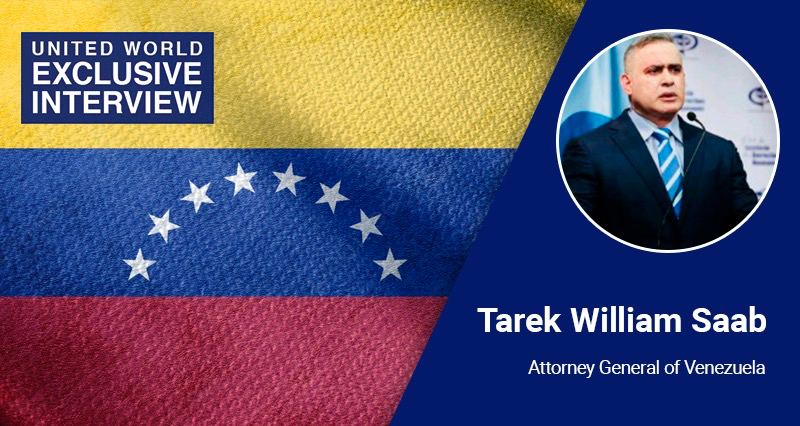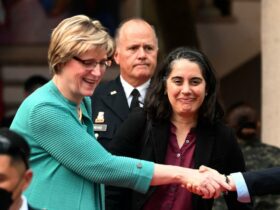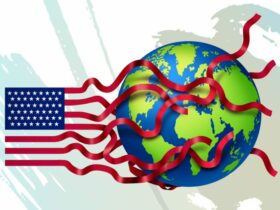By Yunus Soner, Caracas, Venezuela
Venezuela is going to elect its future president today. Parts of the opposition, though, have previously rejected to sign an agreement, promising to recognize the results announced by the National Electoral Council (CNE), the country’s only authorized institution to recognize results.
Tarek William Saab is the Attorney General of Venezuela. He told UWI how parts of the opposition are planning to disrupt the elections.
What type of war do you observe in the context of the elections against Venezuela?
Well, firstly, say that Venezuela is the victim of a hybrid war, which is an unconventional war, it is not the factual war of the use of weapons, bombs, grenades to destroy a population, but something longer in time and of greater lethality, of greater, for me, damage, such as the use of sanctions, the use of distortions of the news, the spread through the great global propaganda posters of fake news, the use of street violence promoted in a style that is such a spring, that is such a spring, as it happened in Ukraine at one time, as it happened in Egypt, at another time.
It’s like the mixture of everything that fourth generation warfare entails to collapse a country and take by storm the power. In the case of the elections, they have wanted to propagate the idea that a poster candidate, who has only been known through a poster, who almost never appears and who is proposed to that candidate by a politically disqualified person, they are going to declare him winner when it is effectively impossible, in Venezuela and in the world, to declare someone the winner of an election without being the electoral referee, without being the electoral power.
It is only the National Electoral Council that can announce results
In the Venezuelan case, it will be up to the electoral power to say who won, at the corresponding time, based on the irreversible nature of the numerical percentage of the vote on July 28 itself. That is the first point. Whoever does so outside the Electoral Power incurs a crime, an electoral crime. And he may be investigated, he may be sanctioned, he may be detained.
Second, I know about this plan that I mention to you, which is part of the hybrid war, not knowing some results. Supposedly launching in clandestine centers that are not those of the National Electoral Council (CNE), based on forged documents, because not only one document cannot leave the voting center. It cannot. The documents are in the hands of the body that is the Electoral Branch.
Then they create some documents that are not from the CNE and suppose, they say, that the vote count is so much in favor of the extreme right candidate. Even in a theatrical manner, they will try to, with all of this that I mention, try to proclaim it. Impossible too.
Behind the hybrid warfare: the United States
I am warning them about that. Who can proclaim, after giving electoral results, a winner in a presidential election, is exclusively the CNE, the Electoral Power. If some else, does it? Unfortunate for them, and I warned about this on Tuesday, a public activity that I had from the Public Ministry, and on Wednesday, at the launch of the Republic Plan. It will have to be condemned because here we have defeated the hybrid war constitutionally, legal and by law.
Who is behind hybrid warfare?
Obviously, the United States of America, obviously as a superpower, its satellites in the European Union, without a doubt, its mass media systems are at the command of that plan. Absolutely, the permanent threats, the sanctions of which Venezuela has been a victim by the United States and the European Union are part of the hybrid war.
These sanctions have caused thousands of deaths in Venezuela, they have collapsed hospitals, schools, the people know about that. The people know this reality also, that we have defeated the sanctions, because, take note, in a pandemic even though we were prevented from buying medicines conventionally, through our alliances with Russia and China and Cuba, Venezuela vaccinated its population, and we were one of the countries with the lowest number of victims and deaths from the COVID-19 pandemic.
So, I feel that we are going to move forward. My call is to tranquility, to peace. These sectors are not going to achieve their objectives, because we have already fully measured them, we have located them, we know where they are, even they thought that July 28 was going to dawn in the middle of a civil war, that there was going to be chaos in the campaign electoral, that there was not going to be an electoral campaign, because they do not believe in the electoral route. They said it. They say they do not believe in the electoral referee, that they are not going to recognize the victory.
So what did they sign up for? Why did they accept the Electoral Power as a constituted body? So, you have to respect the rules, right?
As I am coming from Türkiye, my last question is regarding relations between Venezuela and Türkiye.
To me, the relations between Venezuela and Türkiye, a country that I have visited at least four times, seem exemplary. They are extremely fraternal relationships, they have to do with the commercial, they have to do with the cultural, they have to do with the political. And that was part of Hugo Chávez’s policy of expanding multipolarity. It allowed us to look towards the Middle East, towards Europe, towards Asia, and within that entire framework, obviously to Türkiye.
I feel honored that by next year 2025, a poetry anthology of mine called Dreaming of a Long Journey will be translated into Turkish and I will then be able to present my collection of poems, that poetry anthology in Türkiye in the year 2025.
















Leave a Reply